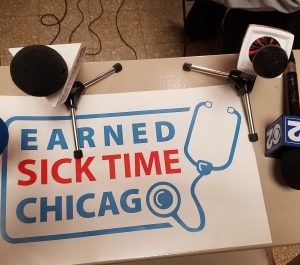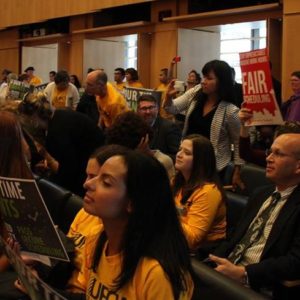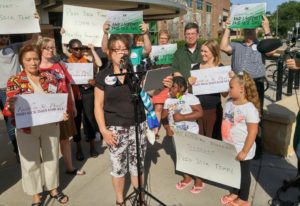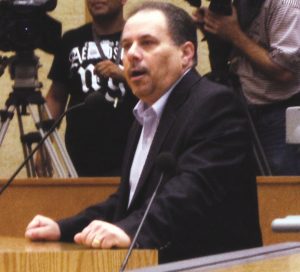 “On behalf of the 8,000 hardworking members of Local 881 UFCW who live and work in every neighborhood of Chicago, I commend the 48 supportive voting members of the Chicago City Council for passing the Earned Sick Leave Ordinance,” said UFCW Local 881 President Ron Powell. “In 2015, voters in every ward of Chicago overwhelmingly supported extending earned sick leave to working families who are one flu season away from losing their job and economic hardship. We are pleased today that the City Council listened to the working people of Chicago! This is a historic step for our city and a victory for workers and our communities.”
“On behalf of the 8,000 hardworking members of Local 881 UFCW who live and work in every neighborhood of Chicago, I commend the 48 supportive voting members of the Chicago City Council for passing the Earned Sick Leave Ordinance,” said UFCW Local 881 President Ron Powell. “In 2015, voters in every ward of Chicago overwhelmingly supported extending earned sick leave to working families who are one flu season away from losing their job and economic hardship. We are pleased today that the City Council listened to the working people of Chicago! This is a historic step for our city and a victory for workers and our communities.”
 UFCW Local 881 was the founding member of the Earned Sick Time Chicago Coalition, a partnership of community, public health, faith, women’s advocacy, and labor organizations that worked together to raise awareness about this issue. The Earned Sick Leave Ordinance takes effect on July 1, 2017.
UFCW Local 881 was the founding member of the Earned Sick Time Chicago Coalition, a partnership of community, public health, faith, women’s advocacy, and labor organizations that worked together to raise awareness about this issue. The Earned Sick Leave Ordinance takes effect on July 1, 2017.
Also in June, San Diego passed legislation that will immediately increase the minimum wage to $10.50 an hour, and then to $11.50 an hour in January. This bill also provides five days of annual paid sick leave. Members of UFCW Local 135 played an important role in the fight for this legislation, which will help hard-working men, women and their families in the San Diego area and improve public health.
 This legislation immediately gives a boost to 170,000 workers in the city of San Diego, where many minimum wage employees work two or more jobs to make ends meet.
This legislation immediately gives a boost to 170,000 workers in the city of San Diego, where many minimum wage employees work two or more jobs to make ends meet.
This new minimum wage increase was a long time coming. Back in 2014, the San Diego City Council voted in favor of raising the minimum wage. However, shortly thereafter, the mayor vetoed it, the city council overrode it and the San Diego Chamber of Commerce stepped in with petitions for a ballot initiative, which halted raises for the working poor for more than two years.
UFCW Local 135 President Mickey Kasparian spoke before the San Diego City Council in favor of raising the minimum wage, and UFCW Local 135 staff phone banked and knocked on doors to get the ballot initiative passed. This victory is the result of an effort, by a diverse coalition led by RaiseUp San Diego, to ensure that no one who works full-time in San Diego is forced to live in poverty.
“The historic passage of an increase in minimum wage and earned sick days for San Diego workers signals a clear turning of the tide in San Diego,” said UFCW Local 135 President Mickey Kasparian. “In the end, a million dollar campaign from out-of-town hotel and restaurant lobbyists and a veto from Mayor Faulconer could not stop San Diegans from voting their conscience. Hopefully, this will alleviate the struggles for workers who make tough decisions like whether to pay the rent or put food on the table.”
In September, the St. Paul City Council passed the Earned Sick and Safe Time Ordinance by a vote of 7-0, joining Minneapolis and dozens of other cities nationwide that mandate earned sick leave. Members of UFCW Local 1189 played a big role in the passage of this legislation.
“The ability to earn and use sick time in the city of St. Paul is a huge step toward creating healthier workplaces and healthier lives,” said UFCW Local 1189 President Jennifer Christensen. “I am proud of the tireless work done by our state’s unions. Bennie Hesse, Local 1189 legislative and political director, was a leader in the crusade, working with Union Steward (and Executive Board Member) Dennis Reeves to provide important testimony to the city council on the need for paid sick and safe time for grocery workers.”
 Members of UFCW Local 1189 served on a task force put together by the city council and mayor for a year and worked with a coalition of advocates and other labor groups to raise awareness about this issue. The Earned Sick and Safe Time Ordinance takes effect on July 1, 2017 for businesses in St. Paul with at least 24 employees. Smaller businesses will have to comply by Jan. 1, 2018.
Members of UFCW Local 1189 served on a task force put together by the city council and mayor for a year and worked with a coalition of advocates and other labor groups to raise awareness about this issue. The Earned Sick and Safe Time Ordinance takes effect on July 1, 2017 for businesses in St. Paul with at least 24 employees. Smaller businesses will have to comply by Jan. 1, 2018.
Also in September, Seattle’s City Council passed a historic Secure Scheduling Ordinance by a vote of 9-0. The new scheduling law will require all retail, grocery and food businesses in Seattle with 500 or more employees to provide their employees with their work schedules two weeks in advance and offer existing part-time employees more hours before hiring more workers. The law will also provide workers with a right to request desired shifts, compensation for last minute scheduling changes, and prohibit back-to-back closing and opening shifts. Members of UFCW Local 21 played a big role in the passage of this legislation.
UFCW Local 21 members testified at every city council hearing, lobbied their elected officials, made hundreds of phone calls, and participated in numerous actions. Seattle’s Secure Scheduling Ordinance will take effect on July 1, 2017.
“Now that we won secure scheduling, I’ll have basic economic security and good workplace scheduling practices,” said Christiano Steele, a UFCW Local 21 grocery worker. “It will allow me to not have to struggle to make ends meet and have a reasonable work-life balance.”